
40 minute read
The Symbols of Offi ce 2
UNITED STATES SENATE

Advertisement
April 30, 2021
Dear Class of 2021,
Congratulations on graduating from Tennessee State University. I am delighted to recognize your achievement, along with your family, friends,
and professors.
You should be proud of this accomplishment. It took a lot of hard work and perseverance to get here. There may have been times when you thought this day would never come, but you pressed forward and are now college graduates. Continue to work hard and persevere through trials as you begin your careers or pursue further education. You have much to offer Tennessee and this nation, and I look forward to seeing how you use your education.
It is an honor to serve you in the United States Senate. Please do not hesitate to contact me if I can assist you in any way.
Congratulations and best wishes for your continued success.
Sincerely, Sincerely,
Marsha Blackburn Marsha Blackburn United States Senator


May 1, 2021
Dear Graduates of the Triumphant Class of 2021,
Congratulations on a job well done!
On behalf of the 26th Administration of the Tennessee State University National Alumni Association, and thousands of TSU alumni across the global spectrum, I am overjoyed to share with you how proud we are of you for all that you have accomplished. Today, we celebrate your esteemed victory.
You possess the spirit of many generations of exceptional tigers. The legendary Wilma Rudolph once stated, “I ran and ran every day, and I acquired this sense of determination, this sense of spirit that I would never, never give up, no matter what else happened.” You, like Ms. Rudolph, never gave up! I assure you that you are not defi ned by the uncertainty of a great pandemic; however, you are defi ned by the certainty of your great strength. We admire how you have patiently, uniquely, and resiliently earned the pomp and circumstance of this day, your graduation day.
As you celebrate, dance in gratitude. Take the time to refl ect upon those encouraging people who have taken this amazing journey with you. Your support circle includes family, friends, teachers, mentors, and memories. You are ready for your next destination. Stand fi rm in the University’s motto, “Think, Work, Serve.” Use this motto as inspiration to help you make this world a better place. Take TSU with you in your community. Take TSU with you in your profession. Take TSU with you in your family. And, forever take TSU with you in your heart.
Of course we have something for you, to receive your graduation gift from TSUNAA, visit www. TSUALUMNIONLINE.org or scan the QR Code below. A complimentary one (1) year membership in the Tennessee State University National Alumni Association awaits activation by you. We look forward to connecting with you, linking you with tigers all over the world, and supporting you as you explore life beyond 3500 John A. Merritt Blvd.
Welcome to the Tennessee State University Alumni Association.
Serve incredibly,
Charles H. Galbreath, Jr., 26th National President, TSUNAA

Tennessee State University is a comprehensive, urban coeducational, land-grant university founded in 1912 in Nashville, Tennessee. The university has two locations – the 500-acre main campus, with more than 65 buildings, located in a residential setting along the Cumberland River; and the Avon Williams Campus, located downtown, near the center of Nashville’s business and government district.
Through successive stages, TSU has developed from a normal school for Negroes to its current status as an international university with students from 45 states and more than 50 countries. By virtue of a 1909 Act of the General Assembly, the Agricultural and Industrial State Normal School was created, along with two other normal schools in the State of Tennessee, and began serving students on June 19, 1912. Dr. William Jasper Hale was appointed president with an original 247 students.
In 1922, the institution was elevated to the status of a four-year teachers’ college and was empowered to grant the bachelor’s degree. The fi rst degrees were granted in June 1924. During the same year, the institution became known as the Agricultural and Industrial State Normal College. In 1927, “Normal” was dropped from the name of the College.

As the college grew in scope and stature throughout the 1920s and 1930s, so too did its impressive roster of alumni who embodied the school’s charge: “Enter to learn, go forth to serve.” In 1943, an alumnus, Dr. Walter S. Davis, was selected to succeed Dr. Hale. Dr. Davis led the institution through an era of tremendous growth in academics, facilities and athletics leading to worldwide recognition. The Tennessee General Assembly of 1941 authorized the State Board of Education to upgrade substantially the educational program of the college, which included the establishment of graduate studies leading to the master’s degree. The fi rst master’s degree was awarded by the college in June 1944.

Accreditation of the institution by the Southern Association of Colleges and Schools was fi rst obtained in 1946. In August 1951, the institution was granted university status by approval of the State Board of Education.
The reorganization of the institution’s educational programs included the establishment of the Graduate School, the School of Arts & Sciences, the School of Education and the School of Engineering. Provisions were also made for the addition of other schools, including agriculture, business, allied health and home economics.

After Dr. Walter S. Davis retired as president, another TSU alumnus, Dr. Andrew Torrence, was named the university’s third president. During his tenure, the state legislature dropped “Agriculture & Industrial” and offi cially changed the name to Tennessee State University in 1968. Also during that same year, TSU faculty member Rita Sanders fi led a lawsuit, which became known as Geier v. Tennessee, alleging a dual system of higher education in Tennessee based on race.

Following the service of Dr. Charles B. Fancher as interim president, Dr. Frederick Humphries became TSU’s fourth president in 1975. He was the fi rst president to face the challenge of maintaining the balance between TSU’s role as one of America’s preeminent historically black universities and its emerging status as a comprehensive national university. During his tenure, on July 1, 1979, the Geier case was settled by a court order merging the former University of Tennessee at Nashville with TSU as a result of a court order.
Following the service of Dr. Roy Peterson as interim president, Dr. Otis Floyd became TSU’s fi fth chief executive in 1987 and continued moving the university forward. In 1988, the university received an unprecedented $112 million from the state general assembly for capital improvements. Under this plan, nearly all buildings on campus were renovated, and eight new buildings were constructed, including the Floyd-Payne Campus Center, the Ned McWherter Administration Building, the Wilma Rudolph Residence Center and the Performing Arts Center.
In 1990, the Tennessee Board of Regents appointed Dr. Floyd as its chancellor, opening the way for Dr. George Cox to serve in an interim capacity until Dr. James Hefner was selected as the University’s sixth president in 1991. Dr. Hefner supervised additional improvements to campus facilities and fostered enrollment growth to an all-time high. The Otis Floyd Nursery Crops Research Station in McMinnville was dedicated in 1996 and, in 1999 researchers at the TSU Center for Automated Space Science were the fi rst to discover a planet outside the solar system.
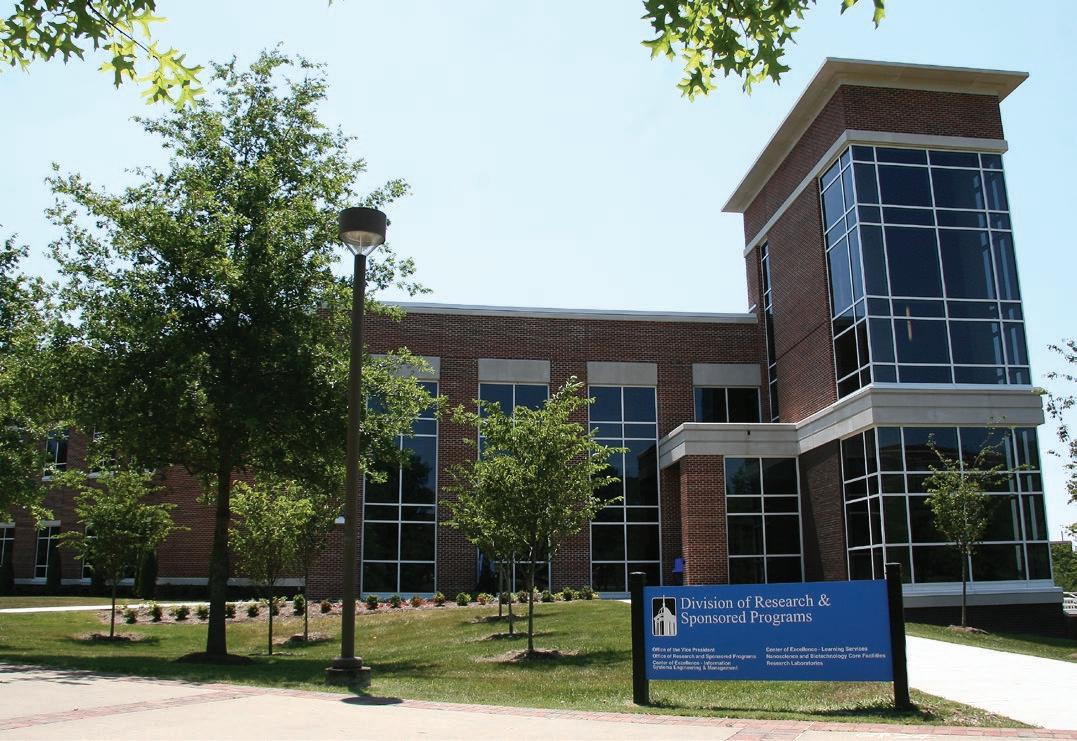
Dr. Melvin N. Johnson became the university’s seventh president in June 2005, and was instrumental in continuing to bring national attention to the university by recognizing the Freedom Riders, engaging the university in the Tennessee Campus Compact and was awarded $8 million for Race to the Top Funds by President Barack Obama. After Dr. Johnson’s retirement, Dr. Portia Shields served as interim president from 2011-2012.
In the university’s second century of academic excellence and service, Dr. Glenda Baskin Glover became the eighth president and fi rst woman to lead the 100-plus year institution in January 2013.
She continues to make changes to further emphasize the excellence for which Tennessee State University is internationally known.
Through its eight colleges and schools, TSU offers 40 undergraduate degrees, 24 master’s degrees, and 8 doctoral degrees: biological sciences, computer information systems engineering, psychology, public administration, curriculum and instruction, administration and supervision, and physical therapy.
In summary, during its 100-plus year history, eight presidents and fi ve interim presidents have served the institution.
William Jasper Hale 1912-1943
Walter S. Davis 1943-1968
Andrew P. Torrence 1968-1974
Charles B. Fancher 1974-1975 (Interim)
Frederick S. Humphries 1975-1985
Roy Peterson 1985-1986 (Interim) Otis L. Floyd
1987-1990, 1986-1987 (Interim) George W. Cox 1990-1991 (Interim) James A. Hefner 1991-2005
Melvin N. Johnson 2005-2011
Portia Shields 2011-2012 (Interim) Glenda Baskin Glover 2013-Present



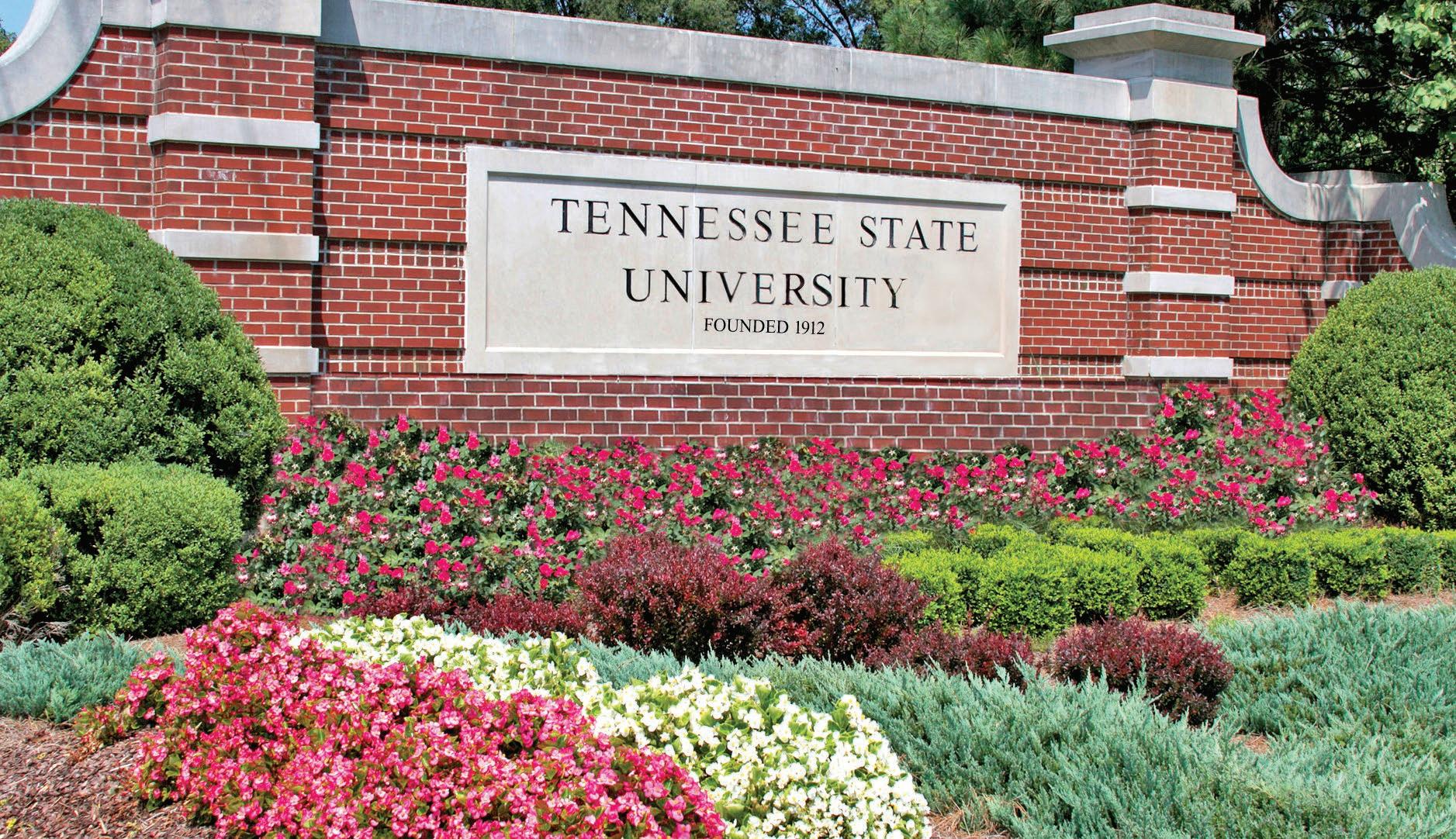
EIGHTH PRESIDENT
GLENDA BASKIN GLOVER, PH.D., JD, CPA
Dr. Glenda Baskin Glover serves as President of Tennessee State University in Nashville, Tennessee, a position she has held since January 2013. Under her leadership as the university’s fi rst female president, TSU has experienced a signifi cant increase in alumni fundraising, research dollars and academic offerings.
Dr. Glover is a certifi ed public accountant, an attorney, and is one of two African American women to hold the Ph.D-CPA-JD combination in the country. Her past employment also includes high level positions in the corporate sector as she is among few women to rise to the heights to serve on corporate boards of publicly traded corporations. These include Pinnacle Financial Partners, The Lenox Group, Citigroup-Student Loan Corporation and First Guaranty Bancshares, where she chairs the audit committee, and is experienced in corporate governance. She is a frequently sought keynote speaker at churches, national conventions, professional associations and community groups.

Her educational development began as a student at Tennessee State University, where she majored in mathematics. After graduating with a Bachelor of Science degree, she pursued the Master of Business Administration from Clark Atlanta University. She then completed her doctorate in business from George Washington University, and later completed her law degree from Georgetown University.
Dr. Glover is a member of several professional, civic, and non-profi t organizations, and currently serves as International President and CEO of Alpha Kappa Alpha Sorority, Incorporated. She is also the recipient of numerous awards and honors, and received the prestigious Thurgood Marshall College Fund Education Leadership Award as the 2018 HBCU President of the Year. Glover was also named to Essence Magazine’s 2019 “Woke 100” List of infl uential African American women change agents and power players that also included First Lady Michelle Obama, and Gayle King of CBS This Morning News. In 2013, she was named to Diverse Issues in Higher Education’s prestigious list as one of the “Top 25 Women in Higher Education.”
Dr. Glover and her husband, Charles, are the parents of two adult children, Attorney Candace Glover-Datcher, and Dr. Charles Glover II. They are also the proud grandparents of three grandsons, Lincoln Mathis Glover, Langston Emmanuel Datcher and Everett Miles Glover.
On the main Tennessee State University campus now stands a giant tiger statue the university calls a symbol of strength and a representation of TSU’s Big Blue pride. The specially commissioned bronze 6-foot-long sculpture, weighing in at 500 pounds, was unveiled Oct. 23 as part of ceremonies marking the 2020 Homecoming.
Standing at nearly 7 feet and mounted on a custommade marble base, the statue is located in front of the Floyd-Payne Campus Center across from the McWherter Circle. The tiger was a student-led project. President Glenda Glover led student representatives, administrators, staff, alumni and community offi cials in an elaborate ceremony to showcase the new campus attraction.
“Today is a special day as we unveil a monument that will represent the spirit of TSU for the next 100 years,” Glover said to a round of applause.
“Generations will mark their presence on this campus in front of this great tiger statue. Tigers are resilient, strong and powerful, as we are. Tigers are determined and confi dent as we are.”

Tennessee State University graduates become local, regional, national, and international leaders:
Traci Otey Blunt, Senior Vice President of Corporate Communications for the National Football Leaguer. Ralph Boston, Chandra Cheeseborough, Barbara JonesSlater, Edith McGuire-Duvall, Wilma Rudolph, and Wyomia Tyus, Olympic gold medalists. T. B. Boyd III, former president and chief executive offi cer, R. H. Boyd Publishing Corporation. Xernona Clayton, retired vice president for urban affairs with Turner Broadcasting/CNN and founder/CEO of the Trumpet Awards. Dr. Deborah A. Cole, former president and chief executive offi cer of Citizens Savings Bank & Trust Co. S. Allen Counter, explorer and Harvard neurophysiologist. Richard Dent, the fi rst TSU alumnus to be inducted into the Pro Football Hall of Fame. The Honorable Myra Hudson Dixon, Chief Judge of the Fulton County State Court (Atlanta, GA) Congressman Harold E. Ford, Sr., the fi rst AfricanAmerican to represent Tennessee in the U.S. Congress. State Senator Brenda Gilmore, Senator for the 19th District in the Tennessee General Assembly since 2019; former member of the Tennessee House of Representatives, 54th District; Served on the Nashville Metro Council from the 1st District from 1993-2003. Dr. Glenda Baskin Glover, fi rst female president of Tennessee State University, and one of only two AfricanAmerican women to hold the Ph.D.-CPA-JD combination in the nation. Moses Gunn, renowned actor who in 1977 received an Emmy nomination for his appearance as tribal chieftain Kintango in the ground-breaking miniseries, Roots; Founder of the Negro Ensemble and received several Obie Awards for his off-Broadway work. State Senator Thelma Harper, Retired Senator for the 19th District in the Tennessee General Assembly since 1991-2018. Her political career has led to the position of delegate for the 1980, 1984, 1988 and 1992 Democratic National Conventions. Claude B. Humphrey, a former American football defensive lineman in the National Football League for the Atlanta Falcons and Philadelphia Eagles. He is a 2014 inductee into the Pro Football Hall of Fame. Dr. Bobby Jones, executive producer of the Bobby Jones Gospel Show and Ambassador-at-large of the Commonwealth of Dominica. Ed “Too Tall” Jones, retired American NFL Football Player spent 15 years with the Dallas Cowboys from 1974-1978 and again from 1980-1989. Harvey Johnson, the fi rst African-American mayor of Jackson, Mississippi. Dr. Richard Lewis, an entrepreneur and president of Lewis & Wright Funeral Home in Nashville, as well as chief fi nancial offi cer of the AME Church. State Representative Harold M. Love, Jr., Member of the Tennessee House of Representatives, 58th District; Pastor of Lee Chapel A.M.E. Church. Obie L. McKenzie, retired managing director at BlackRock in the Account Management Group, one of the largest publicly traded investment fi rms in the United States. He ranks among the Top 10 African-Americans on Wall Street. Dr. Edith Peterson Mitchell, former President of the National Medical Association and Clinical Professor of Medicine and Medical Oncology at Jefferson Medical College of Thomas Jefferson University. Lloyd W. “Fig” Newton, 4-star general, retired as highest ranking African-American in the Air Force. Jo Ann North, a former Davidson County Property Assessor, and fi rst woman elected as an At-Large member of the Metropolitan Council of Nashville, Davidson County. Jesse Russell, pioneer in the development of the cellular telephone. Dr. Catana Starks, former faculty member and department chair, was the fi rst female head coach of an NCAA Division I men’s golf team, and coached the team to the National Minority Golf Championship in 2005. Starks story has been captured and shared with the world in the feature fi lm, From the Rough. Carla Venita Thomas, an American singer, who is often referred to as the ‘Queen of Memphis Soul.’ Dr. Maria Thompson, former president, Coppin State University, Baltimore, Maryland. Dwayne Tucker, Campus Executives, LLC – Nashville Management Group; Chairman of Board of Trustees for the TSU Foundation. Dr. Levi Watkins, Jr., M.D., obtained worldwide recognition for implanting the fi rst defi brillator for the heart; former associate dean and cardiac surgeon at Johns Hopkins University School of Medicine. A.C. Wharton, former mayor of Memphis, Tennessee, and former mayor of Shelby County (TN) – fi rst AfricanAmerican to serve. Kevin Williams, immediate past president and managing director of General Motors Canadian operations; a TSU Foundation Board of Trustees member. Oprah Winfrey, owner of Oprah Winfrey Network, Talk Show Host, Television Producer, Philanthropist, and Actress. Brenda Wynn, Davidson County Clerk, fi rst AfricanAmerican female to win an election to a constitutional offi ce in the county.
Vision, Mission and Core Values
VISION STATEMENT
Tennessee State University aspires to be the premier public urban, comprehensive institution achieving prominence through innovation and instruction, research, creativity, and service with the dissemination of knowledge and information.
MISSION STATEMENT
Tennessee State University, through its legacy as an HBCU and land grant institution, transforms lives, prepares a diverse population of leaders, and contributes to economic and community development by providing affordable and accessible educational programs at various degree levels promoting academic excellence through scholarly inquiry, teaching, research, lifelong learning, and public service.
CORE VALUES
Tennessee State University maintains the following core values: • Learning everyday • Working relentlessly • Making excellence a habit • Serving everyone, we encounter • Thinking beyond the obvious
STATEMENT OF PURPOSE
Tennessee State University, an HBCU and 1890 land grant institution, is a major state-supported urban and comprehensive university. This unique combination of characteristics differentiates the university from others and shapes its instructional, research, and service programs designed to serve Metropolitan Nashville, Middle Tennessee, the State of Tennessee, the nation, and the global community. The university is committed to maintaining its diverse student body, faculty, and staff. Tennessee State University provides quality instruction through academic programs which are broadly comprehensive at the baccalaureate and master’s levels. Doctoral programs are offered in select areas where the University exhibits strength in instruction and research and consistent with the University’s unique mission. The University’s educational programs are intended to increase the student’s level of knowledge, enhance the student’s skills, and expand the student’s awareness. Tennessee State University is committed to engaging in pure and applied research which contributes to the body of knowledge and which broadens the application of knowledge. Whenever possible, the university strives to provide its students with the opportunity to be involved in the research activities of the faculty and academic staff.
Tennessee State University serves its constituents through an array of programs and services which apply the knowledge, skills and discoveries of the instructional and research units at the institution. These services are intended to broaden the perspectives and enhance the quality of life of the University’s service constituents. Tennessee State University expresses its commitment to students’ overall development by promoting lifelong learning, scholarly inquiry, and a commitment of service to others. Programs and services are geared toward promoting and nurturing students’ growth and development as persons who are liberally educated, appreciate cultural diversity and embody a sense of civic and social responsibility. Tennessee State University projects itself to its students, faculty, and alumni and to the citizens of the State through the motto, “Think. Work. Serve.” Tennessee State University remains committed to the education of a non-racially identifi able student body and promotes diversity and access without regard to race, gender, religion, national origin, age, disability, or veteran status.
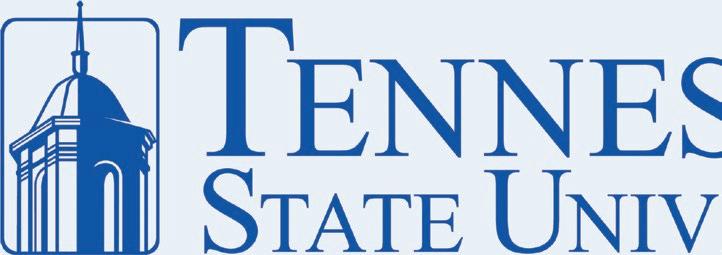
Executive Officers
Dr. Glenda Baskin Glover President
Dr. Michael Harris Interim Provost and Vice President, Academic Affairs
Mr. Frank Stevenson Associate Vice President, Student Affairs
Dr. Frances Williams Associate Vice President, Research and Institutional Advancement
Mr. Terrence Izzard Vice President, Enrollment Management & Student Success Dr. Curtis Johnson Chief of Staff
Ms. Kelli Sharpe Assistant Vice President, Public Relations & Communication
Chief Gregory Robinson Assistant Vice President and Chief of Police Attorney Laurence Pendleton General Counsel & Secretary, Board of Trustees
Dr. Michael Allen Director, University Athletics




Academic Deans
Dr. Chandra Reddy Dean, College of Agriculture Dr. Millicient Lownes-Jackson Dean, College of Business Dr. Jerri Haynes Dean, College of Education Dr. S. Keith Hargrove Dean, College of Engineering Dr. Ron Barredo Dean, College of Health Sciences
Dr. Samantha Morgan-Curtis Interim Dean, College of Liberal Arts Dr. Nolan McMurray Interim Dean, College of Life and Physical Sciences Dr. Elizabeth Williams Interim Dean, College of Public Service Dr. Robbie K. Melton Dean, School of Graduate and Professional Studies


Tennessee State University is accredited by the Commission on Colleges of the Southern Association of Colleges and Schools (SACS) to award the associate, bachelor’s, master’s, specialist in education and doctoral degrees. In addition, the following programs and associations support the high quality education available on the TSU campuses.
COLLEGE OF AGRICULTURE Family and Consumer Sciences (B.S. American Association of Family and Consumer Sciences, American Dietetics Association)
COLLEGE OF BUSINESS Business (B.B.A., M.B.A., AACSB is the Association of Advance Collegiate Schools of Business International) COLLEGE OF EDUCATION Education (B.S., M.S., M.A.Ed., Ed.S. Ed.D: National Council for Accreditation of Teacher Education (NCATE)
Psychology (B.S., Ph.D with concentration in Counseling: American Psychological Association (APA) COLLEGE OF ENGINEERING Aeronautical & Industrial Technology, Architectural & Mechanical Engineering, Civil & Environmental Engineering, Electrical & Computer Engineering (B.S.: Accreditation Board for Engineering and Technology) COLLEGE OF HEALTH SCIENCES Cardio-Respiratory Care Sciences (B.S.: Commission on Accreditation of Allied Health Education Programs)
Dental Hygiene (A.A.S., B.S.: Commission on Dental Accreditation)
Health Care Administration and Planning (B.S.: Association of University Programs in Health Administration) Health Information Management (B.S.: Commission on Accreditation of Allied Health Education Programs in collaboration with the Council on Education of the American Health Information Management Association) Medical Technology (B.S.: National Accrediting Agency for Clinical Laboratory Sciences) Occupational Therapy (M.O.T.: Accreditation Council for Occupational Therapy Education (ACOTE) of the American Occupational Therapy Association.)
Physical Therapy (D.P.T.: Commission on Accreditation in Physical Therapy Education (CAPTE))
Speech Pathology and Audiology (B.S., M.S.: Council of Academic Accreditation of the American SpeechLanguage-Hearing Association) Nursing (A.A.S., B.S.N., M.S.N.: The Accreditation Commission for Education in Nursing) COLLEGE OF LIBERAL ARTS Art (B.A.: National Association of Schools of Art & Design), Music (B.A.: National Association of Schools of Music), Social Work (B.S.: The Council on Social Work Education) COLLEGE OF LIFE AND PHYSICAL SCIENCES Committee on Professional Training (CPT) of the American Chemical Society (ACS) COLLEGE OF PUBLIC SERVICE Public Administration (M.P.A.: e National Association of Schools of Public A airs and Administration) Bachelor of Science in Social Work (B.S.S.W.) The Council on Social Work Accreditation (CSWE)

The College of Agriculture offers teaching, research and extension functions and B.S., M.S., and Ph.D. degrees through four academic units: the Institute of Food, Agricultural and Environmental Research, the Cooperative Extension Program, and four research centers—the Center for Prevention Research, the Otis L. Floyd Nursery Crops Research Center, and the Agricultural Research and Education Centers at Nashville and Ashland City. The academic units are: the Department of Agricultural and Environmental Sciences, the Department of Biological Sciences, the Department of Chemistry, and the Department of Family and Consumer Sciences. Recently, the College has been improving and expanding, including some of these highlights: • Agricultural enrollment has more than doubled while graduate student enrollment has increased eight-fold. • In early 2018, the U.S. Department of Agriculture awarded more than $2 million in teaching, research and extension capacity building grants to seven Tennessee State University professors in the College of Agriculture. • In 2018, the College opened six new laboratories and re-opened fi ve newly remodeled labs, bringing the total number of state-of-the-art laboratories at the College to 35. • In 2017, the College received nearly $500,000 from the federal government to expand its research on goat meat production. • The Dean’s Scholars Program and pre-college summer apprenticeship programs continue to attract highly qualifi ed students. • The College’s educational programs help educate minorities in STEM fi elds and offer pre-professional programs in medical, dental and veterinary medicine. • Through youth and community development programs (4-H and FFA), the College teaches and encourages youth in science and engineering, as well as valuable leadership and life skills. • In 2011-2012, TSU agriculture received the highest dollar amount grants and contracts among peer institutions. In fact, the college’s current research outlays are about $55 million—a three-fold increase in four years. • Research in the College is focused on bio-energy, environmental sustainability, human health/nutrition/ obesity/cancer, food safety and food security. • The Nursery Crops Research Center at McMinnville provides leadership, research and support for improving the Tennessee Nursery industry. • University outreach in Tennessee communities has expanded to include agents in 50 counties—another threefold increase in four years. Technical assistance is provided to farmers, homeowners, and the general public on a variety of issues including crop, animal production and human health. • The college has engaged in multiple construction projects including a 25,000 square foot Agricultural Biotechnology building, six new greenhouses, a new landscape studio, an agricultural education workshop, and a fi eld research support building—totaling a commitment of nearly $11 million.


Tennessee State University’s College of Business was the fi rst business school in Nashville to earn dual accreditation from the Association to Advance Collegiate Schools of Business (AACSB International), the most prestigious accrediting body for business schools. The College of Business earned its initial accreditation from AACSB in 1994. Such achievement resulted in Tennessee State University becoming the fi rst university in Nashville and the fi rst public Historically Black College and University (HBCU) in the country to gain dual accreditation at both the undergraduate and graduate levels. • The College of Business has approximately 900 students and is also home to nationally recognized outreach programs including its Nashville Business Incubation Center, Tennessee Small Business Development Center, Offi ce of Business and Economic Research, and Offi ce of International Business Programs. • The university’s new Executive MBA program is helping to make Nashville even more competitive when it comes to business leadership. The 12-month program, which starts in the fall, is delivered in a hybrid format consisting of both in-person and online course offerings. Program participants also have the opportunity to spend 10 days studying outside the United States to broaden their understanding of global leadership. • The College of Business offers Bachelor of Business Administration programs to undergraduates in Accounting, Business Administration, Business Information Systems, and Economics and Finance. Concentrations are available in Supply Chain Management, Marketing, Management, Human Resource Management, Hospitality, Real Estate and Urban Development, Business Information Systems—Industry, and e-Business Technology. Additionally, the College offers minors in General Business, Entrepreneurship, and International Business. At the graduate level, the Master of Business Administration is offered with concentrations in Accounting, Management of Information Systems, Healthcare Economics and Management, and Supply Chain Management. • Recently, 24 students participated in study abroad programs that included China, Italy, and the great European capitals. Additional efforts in international education include a memorandum of understanding with Tianjin University in China and Meliksah University in Turkey; both initiatives are aimed at increasing enrollment in the College’s MBA program. • Accreditation and assurance of learning remain a top priority as the College continues with strategies and processes to gain separate accreditation in Accounting from AACSB International. • The College successfully recruited two distinguished scholars to hold the Frist Chair of Excellence in Business with a focus in Accounting and the newly endowed Chair of Excellence in Banking and Financial Services. The College is continuing its efforts to raise funds for a third Chair of Excellence in Supply Chain Management. • The College of Business has established alliances with a long list of community organizations that provide resources earmarked for internships and scholarships, business industry needs assessments, and recommendations for continuous curriculum improvements. The COB community partners include: Corning, Dell, Boeing, HCA, Lemark, Ernst & Young, Asurion, Regions Bank, KraftCPAs, Nissan, PricewaterhouseCoopers, just to name a few. • The Financial Trading Room is a state of the art facility designed to give students hands-on training and knowledge regarding the stock market and trading.


The College of Education prepares students to be professionals in schools and communities by fostering the development of critical thinking, technological skills, diversity competency, scholarly research, and a life-long commitment to service. Refl ecting the historical purpose of the Tennessee Agricultural and Industrial State Normal School—now Tennessee State University—the College is dedicated to producing competent and caring teachers, leaders, and other community servants through its programs in the departments of Educational Leadership, Psychology, and Teaching and Learning. All three departments exemplify the excellence for which TSU stands by demonstrating best practices in teaching, conducting fi rst-class research, and selfl essly serving the community.

The Department of Teaching and Learning was awarded four Grow-Your-Own grants by the Tennessee Department of Education to partner with 15 school districts across the state to prepare teachers with dual certifi cations. The Educator Preparation Program (EPP), noted for its full-year, co-teaching residency model of student teaching, was one of the fi rst Tennessee programs to negotiate a virtual alternative with school districts in order to accommodate students during the COVID-19 pandemic. TSU’s EPP continues to be one of the most prolifi c producers of teachers for the Metro-Nashville Public Schools (MNPS). TSU’s undergraduate and graduate elementary education programs were recognized by the National Council on Teacher Quality for contributing to racial diversity in teaching, demonstrating effective classroom management, and promoting early reading standards.
The Department of Educational Leadership was awarded an Aspiring Assistant Principals Network grant to prepare teachers to become assistant principals; the department subsequently received a two-year extension of the grant. Most of the assistant principals and principals in MNPS are graduates of TSU. The current director of MNPS is a TSU graduate.
The Department of Psychology engages in cutting edge research, including a research grant from the National Institute of Neurological Disorders and Stroke (NINDS). The Ph.D. Program in Counseling Psychology is one of only two HBCUs accredited by the American Psychological Association (APA). The program’s excellence in the recruitment, retention, and graduation of minority students earned the department the prestigious Suinn Minority Achievement Award.
The College of Education is also the recipient of a NASA Minority University Research and Education Project (MUREP) grant. Entitled the MUREP Aerospace Academy, this is a collaborative effort between Tennessee State University, NASA, and MNPS. Providing students in grades K-8 with STEM education throughout the academic year, the project aims to inspire, engage, and educate students and their families about the infi nite possibilities in STEM degrees and careers.

The College of Engineering is challenged and committed to providing the highest quality industrydriven curricula in Engineering, Technology, Mathematical Sciences and Computer Science to meet the growing demand for STEM (Science, Technology, Engineering, and Math) professionals in industry, government and entrepreneurship. • The College currently provides bachelor’s degrees in Architectural, Civil, Electrical and Mechanical Engineering with several concentrations such as manufacturing, environmental, facilities and computer engineering. The college also awards degrees in Aeronautical & Industrial Technology, Computer Science, Mathematical Sciences and graduate degrees for the Master of Engineering and M.S. and Ph.D. in Computer and Information Systems Engineering. • The College of Engineering’s students and faculty continue to receive national recognition for their top-notch research. Students from the College recently received praise for their design of a special transport vehicle for the U.S. Air Force Special Operations Force. Studies by several graduate and undergraduate students have also been used by local city offi cials to determine the safety of bridges around Nashville. • Recognizing the need for developing graduates with an appreciation for global awareness, solid engineering fundamentals and professionalism, the college strives to develop and promote an educational experience that produces the “global engineer” through life or language learning, a FE-based (Fundamentals of Engineering) curriculum for outcome assessment and critical skills in research, design, problem solving and communication. A dedicated faculty and staff seek to integrate innovative approaches to instruction, laboratory experience and internships to address the contemporary challenges of the profession and engage the community through service and outreach. • The College of Engineering’s programs complement the student learning experience with aggressive research initiatives in areas such as intelligent sensors, robotics, manufacturing, environmental issues, data fusion, cyber-security, renewable energy, nano-materials and signal/image processing. The Engineering Research Institute (ERI) serves as the primary entity to collaborate and partner with industry and government, complemented by several research centers in specifi c areas of scientifi c investigation. • As the leading producer of African-American engineers in the state, the college continues to strengthen its partnerships with local, regional and national corporations and government. Producing a diverse population of graduates has prepared quality students for employment with companies such as IBM, GM, Corps of Engineers, TDOT, Raytheon, Lockheed Martin, P&G, and Boeing and the U.S. Navy and Air Force.
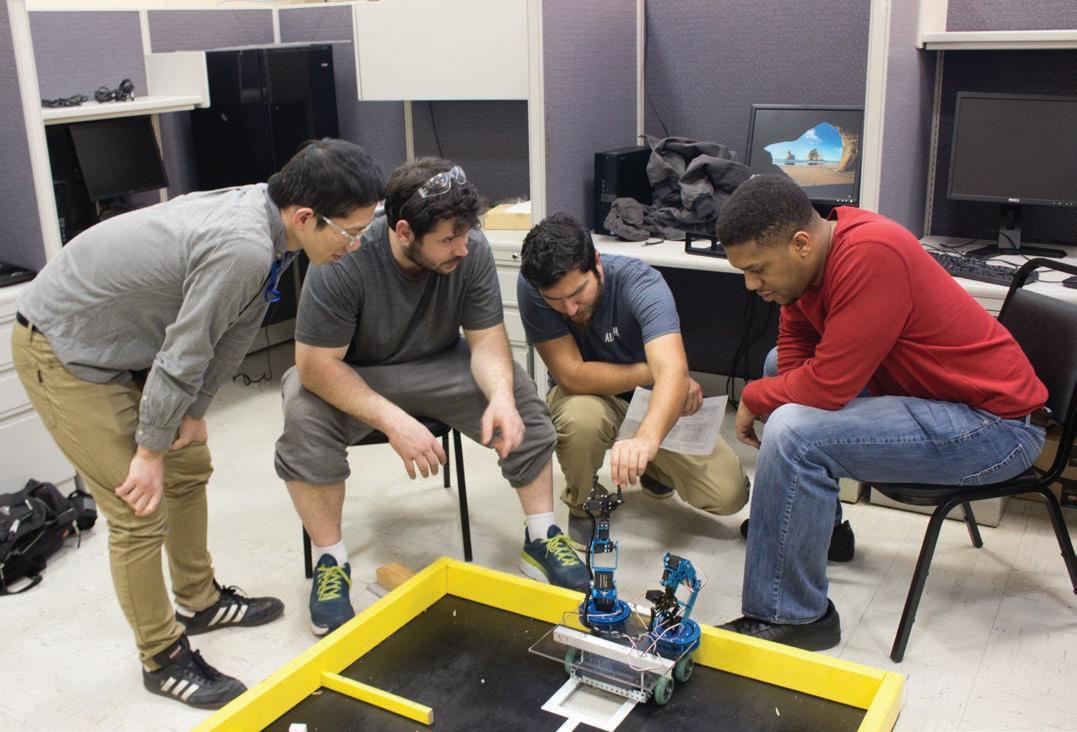
The College of Health Sciences at Tennessee State University serves 742 students in programs ranging from Associate to Doctoral degrees. Some unique aspects of the College are: • The College offers two Clinics that serve the public: Dental Hygiene and Speech and Language – at low or no cost. • The College’s Dental Hygiene program has two degrees, an AAS in Dental Hygiene and a BS Degree Completion. Our state-of-the-art Dental Hygiene Clinic utilizes emerging equipment and technology, and provides service to nearly 600 patients a year, including students, as well as the Greater Nashville Community. We currently maintain 83% persistence to graduation rate, along with two (2) year didactic/written based–National Board Dental Hygiene Examination, (NBDHE) pass rate of 94% and clinical based–Southern Regional Testing Agency, (SRTA)test score of 94% that lead to professional licensure. • The Department of Speech Pathology and Audiology offers a Master of Science (MS) Degree in both traditional and distance education formats. The online graduate progam in Speech and Hearing Science holds the distinction of being the fi rst distance education program at Tennessee State University as well as the fi rst distance education program in the area of Speech–Language Pathology in the State of Tennessee. • The School of Nursing offers two career mobility accelerated degree completion programs in nursing including: the LPN-AASN/RN Program and the RN/BSN Program, each specifi cally designed for the working nurse. • The Physical Therapy Program has a partnership with LEND (Leadership Education in Neurodevelopmental Disabilities) program with Vanderbilt University. The two-year aggregate pass rate of graduates of the Doctorate of Physical Therapy program for the classes of 2016 and 2017 is 97 percent. • The College has a new partnership with Hillwood High School’s Academy of Health Sciences. • The Occupational Therapy program has ten year accreditation through ACOTE; job outlook according to U.S. News & World Report, January 2018: OT is ranked number 11 of the Best Jobs for 2018. Class of 2018 passrate is 93 percent as of August 2018. 30 students admitted annually. • The Public Health, Health Administration and Health Sciences programs offer two undergraduate degrees and one graduate degree program: Health Sciences, Health Care Administration and Planning and Master in Public Health. • The Cardio Respiratory Care program has an overall employer satisfaction of 100 percent. • The Health Information Management program has an overall 95 percent retention rate of students accepted junior/professional level class and over 90 percent job placement. • HPSS was awarded a transformational 5-year Title III grant to renovate/develop state-of-the-art classrooms and two applied physiology laboratories, beginning October, 2017.


Associate Degree Programs
Dental Hygiene • Nursing
Bachelor’s Degree Programs
Cardio Respiratory Care • Dental Hygiene Health Care Administration and Planning Health Information Management • Health Sciences Human Performance Sport Sciences • Nursing
Master's Degree Programs
Occupational Therapy • Speech Pathology Human Performance Sport Sciences
The College of Liberal Arts offers courses and programs in the arts, humanities, and social sciences, preparing students for a wide range of graduate and professional opportunities.
From the traditional academic disciplines at the heart of a university education to new interdisciplinary fi elds, major and minor programs in the College promote a vision of liberal learning that recognizes the unique gifts, interests and goals of each student.
By engaging with the rich intellectual traditions, promoting knowledge of global cultures, and developing vital career skills, Liberal Arts courses and programs prepare their graduates for resilience and adaptability, lifelong learning, and leadership in a changing world.
The faculty of the College of Liberal Arts is committed to helping students make the most of their college education. Whether majoring in a Liberal Arts program, enriching a degree with a Liberal Arts minor or simply taking a class, the College supports each student on their intellectual journey.


The College boasts one of the top Forensics teams in the nation. It’s so well respected, that TSU was selected in 2018 to host the Pi Kappa Delta National Forensics Tournament. It was the fi rst time in nearly two decades that a historically black college or university hosted the tournament.
The Liberal Arts vision of education is about exploration. From English, art, theater, and music to history, political science, criminal justice, and mass communications, Liberal Arts disciplines put the intellectual growth of the student at the center of the university experience.
All of the majors in the College of Liberal Arts are guided by common core values:
• Integrative Learning • Responsibility • Professional Competency • Creativity • Critical Thinking and Reasoned Judgment • Student Service and Support
Bachelor’s Degree Programs
• Art • Communications • Criminal Justice • English • History • Interdisciplinary Studies • Music • Political Science
Master’s Degree Program
• Criminal Justice
The College of Life and Physical Sciences offers research opportunities and instruction in biological sciences, chemistry and mathematics. A specifi c goal of the college is to increase the proportion of underrepresented minorities in life and physical sciences and mathematics fi elds.
Department of Biological Sciences
The Department of Biological Sciences offers a variety of undergraduate and graduate degrees: • Bachelor of Science (B.S.)–General Biology • Bachelor of Science (B.S.)–Cell and Molecular Biology • Bachelor of Sciences (B.S.)–Teacher Certifi cation/Licensure (Grades 7-12) • Master of Science (M.S.)– Biology • Doctor of Philosophy (Ph.D.) in Biological Sciences A variety of courses in the botanical, microbiological, molecular biological and zoological life science areas are offered at both the undergraduate and graduate levels. The Department also has a cooperative program with Meharry Medical College in which students complete their TSU degree while working on a medical or dental degree at Meharry, thus saving a year in their education. The Bachelor of Science program provides training in the basic biological sciences leading to the B.S. degree in biology for: • pre-health professionals • entry into life science graduate training programs • acquisition of entry level positions in the job market • students seeking certifi cation for secondary teaching careers, and • graduate training leading to the master of science and doctor of philosophy degrees
Department of Chemistry
Chemistry involves the composition, structure, and behavior of matter. The Department of Chemistry offers a variety of undergraduate and graduate degrees, and its Bachelor of Science program is approved by the Committee on Professional Training (CPT) of the American Chemical Society (ACS). The following undergraduate and graduate degrees are offered in the Department of Chemistry: Bachelor of Science (B.S.) in Chemistry with the following concentrations: • Professional Chemistry-ACS Approved • Biochemistry Concentration (Pre-Med, Pre-Pharmacy and Pre-Dentistry Conc) • Teacher Certifi cation Concentration • Chemistry Concentration Master of Science (M.S.) in Chemistry with the following concentrations: • Professional Chemistry Concentration • Biochemistry Concentration
Department of Mathematical Sciences
Mathematics is an essential grounding for many different disciplines and is used in many of the sciences for quantifying statistics and data. The Department of Mathematical Sciences provides students a general framework in mathematics which will suit the critical thinking and problem-solving skills required in varying fi elds. A Bachelor of Science (B.S.) degree is offered in: • Mathematics An undergraduate minor is offered in: • Mathematics • Astronomy


The College of Public Service became operational January 2008 with the appointment and arrival of the founding dean, former Nashville Mayor Bill Purcell. The new College fulfi lled the Geier Consent Decree of 1984 and from the Institute of Government has expanded to include the Department of Public Administration and the Department of Sociology, Social Work and Urban Professions. The intent of the Consent Decree was to establish a division that would address the workforce needs of the city and state in the various areas of government and public service.

The mission of the College is to educate, socialize and serve students and employers of nonprofi t, health and urban organizations by: • THINK – Providing educational programs that build skills in knowledge of sociology, social work, urban affairs, public administration and leadership; • WORK – Conducting scholarly and applied research activities supportive of these educational purposes; • SERVE – Consulting and applying research and knowledge of social programs. The College features three undergraduate degrees: • B.S. in Urban Studies, B.S. in Sociology and B.S. in Social Work; • Two undergraduate minors in Nonprofi t Management and Leadership; • Six graduate degrees: online Master of Professional Studies, Master of Public Administration, a Graduate Certifi cate in Health Planning and Administration, a Graduate Certifi cate in Non-Profi t Management, a Master of Social Work (the only multi-collaborative master’s program among three universities in the country), and a Ph.D. in Public Administration (the only degree of this level in Tennessee at a public institution). Where are CPSUA graduates? At the Tennessee Department of Labor, the Tennessee Department of Safety and Homeland Security, the U.S. Missile Defense Agency, the Tennessee Department of Human Services, TennCare Bureau, Juvenile Justice, serving in Student Professional Development, as elected offi cials, in social services in cities throughout Tennessee, the Tennessee Division of Intellectual Disabilities, the Tennessee Supreme Court, the Tennessee Department of Corrections, the Board of Regents, the Department of Internal Revenue, Centerstone, youth service agencies and many others.

School of Graduate Studies and Research
The Tennessee General Assembly authorized the state Board of Education to establish graduate studies leading to the master’s degree in several fi elds at Tennessee State University (then called Tennessee Agricultural and Industrial (A & I) State College) in 1941. Today, the School of Graduate Studies and Research offers seven doctoral degrees, 24 master’s degrees, one educational specialist degree and six graduate certifi cate programs.
• In fi scal year 2011-2012, the School of Graduate Studies and Research, in collaboration with various units on campus, awarded more than 300 graduate assistantships to qualifi ed graduate students totaling approximately $3 million. • In collaboration with the TSU Foundation, the School of Graduate Studies and Research in the past two years awarded the Walter S. Davis Scholarships to several fi rst-time high achieving graduate students (with minimum undergraduate cumulative GPA of 3.75). The Walter Davis Scholarship Fund was established in memory of Dr. Walter S. Davis, president of Tennessee State University (1943-1968). • Each spring semester, the School of Graduate Studies and Research recognizes excellence in graduate student research by awarding the Helen Barrett Award to one TSU graduate student. The 2012 winner and recipient of the Helen Barrett Award was Victor L. Roland II, a master’s student in engineering. In recognition of his work, Roland received a prize of $200 and certifi cate signed by the University’s president and graduate dean. As the winner of the Helen Barrett Award, Rowland showcased his research at the annual poster presentation organized by the Tennessee Conference of Graduate Schools at the Legislative Plaza in downtown Nashville on April 4, 2012. Dr. Mengistu Hailu, a 2011 graduate of Tennessee State University, has been appointed director of the Institute of Pedagogical Sciences of Mekelle University, Ethiopia. Dr. Hailu is tasked with moving the institute forward by developing a new College of Education. The institute currently offers undergraduate and graduate programs in the fi eld of Educational Planning and Management; a post graduate diploma in teaching (a program that certifi es high school teachers); and a higher diploma program that certifi es university lecturers.

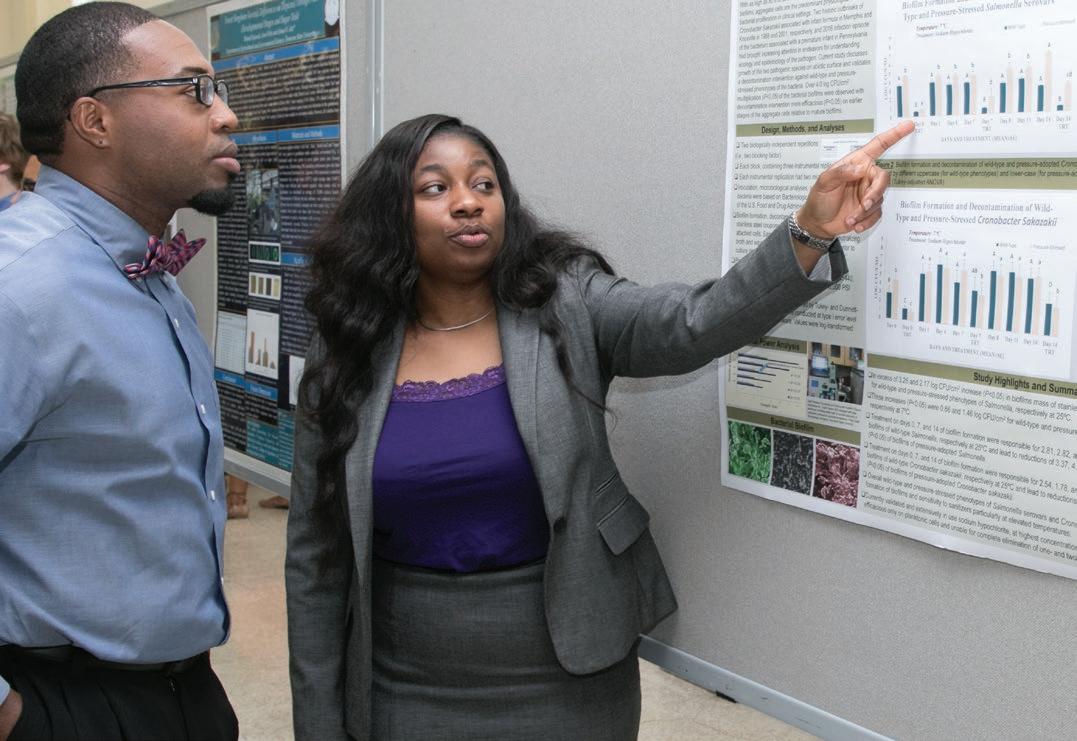
The University Seal In 1922, Dr. William Jasper Hale, fi rst president of Tennessee A. and I. Normal School, asked Frances Thompson, professor and department head of Art, to design the University Seal. Enclosed in a circle, the seal is divided into three parts: ‘Agriculture’ upper left, ‘Industry’ upper right, ‘Education’ in lower center. Education is further emphasized by a hand holding a light with rays extending above the seal. The motto, “Think. Work. Serve.” is placed beneath the seal for support.
Presidential Medallion and Chain of Offi ce The Presidential Medallion and Chain of Offi ce serves as a symbol of authority as head of the university. It originated in medieval times and is worn by the president of the university on ceremonial occasions such as commencement, convocations or other formal occasions.
The front of the Medallion and Chain of Offi ce bears the offi cial University Seal. The backside of the medallion contains a circular seal with a blue border bearing the President’s motto in latin: NIL SINE MAGNO LABORE - “Nothing without Great Effort.”
Each link of the chain holding the medallion is inscribed with the name of a past president of the institution and his term in offi ce. Holding together these links and supporting the medallion is a bronze leaf cluster.
University Mace and Baton In 2005, the mace and baton was conceptualized. The Lapis stone characterizes the TSU Blue and is used to stimulate inner vision and give enhanced wisdom, insight and good judgment. The pearl stone represents the TSU White and symbolizes the wealth, purity and power of knowledge. The head and fl anges of the mace are modeled after the Floyd-Payne Campus Center Tower located on the university’s main campus. The refl ective quality of the polished silver signifi es the vision of the university.
The baton of the mace is made of wood which is a forest symbol or the symbol of a provider. It represents a tree of knowledge around which each college and school is mounted. This aspect of the mace serves to link the university with its cultural heritage, as well as TSU’s ancestral past.
The three-tier stand for the mace embodies the motto: “Think. Work. Serve.” This aspect of the mace constitutes the foundation of the university that holds the mace in place and represents the classical architectural structure of the educational values at the university. On top of the mace is the seal of the university. Together, the mace and baton are borne as a symbol of authority in the Processional and Recessional at occasions such as Commencement and Inaugural ceremonies.
The mace is carried by the University Chief Marshal in front of the Platform party that is composed of the President, Vice Presidents, Tennessee Board of Regents Representatives, other authorities and distinguished guests.




